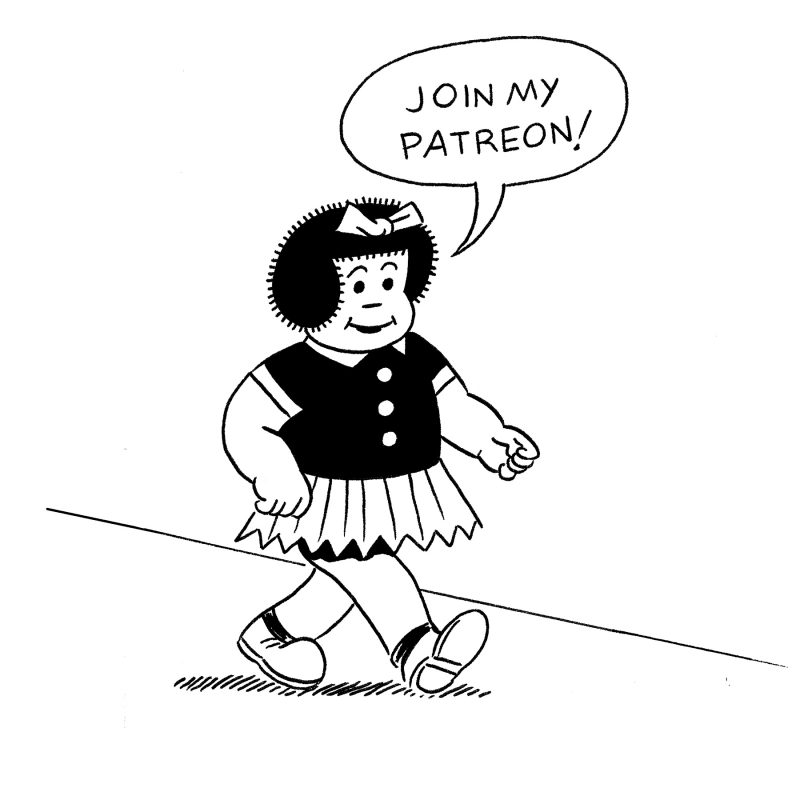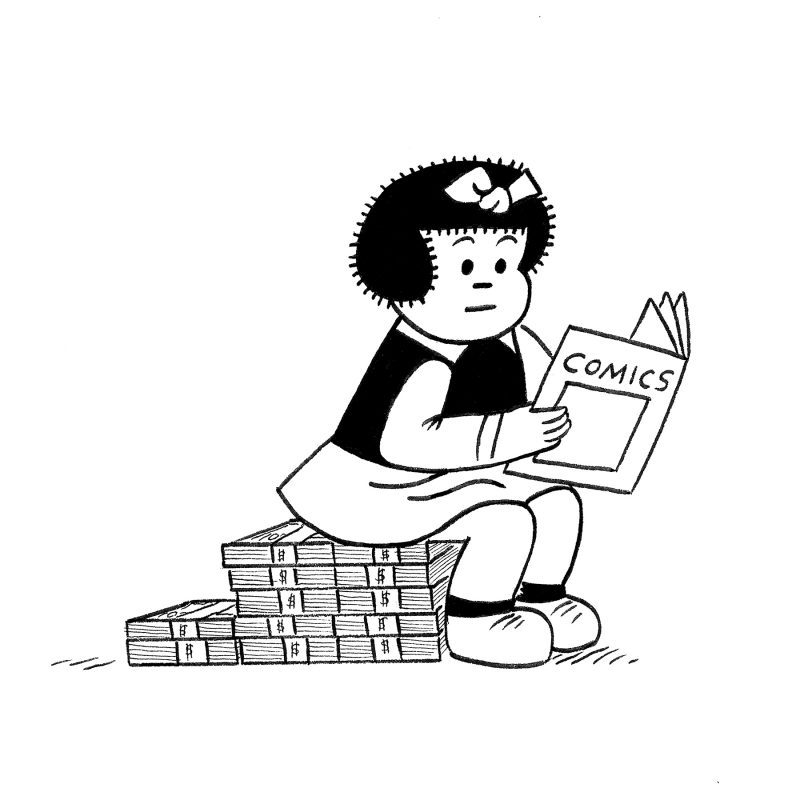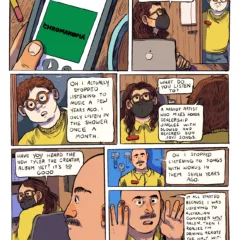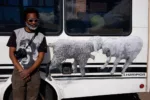
Long time reader and wanna be comics writer asks…
How do you make money from comics?
Wow, finally an easy question. Just kidding. I wish I knew! Ok, I’ll stop making jokes. This is where you might be thinking “Actually, you’re not funny.” I want to start off being as open as embarrassingly possible about my own foray making money in comics and then go on sharing what I’ve learned from my comics community in professionalizing your comics practise. It’s important to mention that community includes people across all genders, race and class (trust me, I’m the poorest). In the end here, we’ll have a pretty clear portrait of what it’s like making a living in comics (indie comics) right here in Philadelphia. And I’m pretty f*cking excited about that because honestly – it feels like it’s a secret.
Indie Comics
For starters I learned it actually is harder to make money in comics in Philadelphia outside the comics spheres of New York City and Portland. The downside being the rent is high in both places.
Making money in comics, like making comics, is a creative endeavor. There’s no right way to go about it – it’s as unique as the artist themself. The few consistencies are ambition, determination and hustle. Gross. Sounds like capitalism. Wait till hear me go on about all the gigs.
Again, without the parentheses, I’m talking about indie comics. I personally do not really know anyone who writes or illustrates for, as comic artist Derick Jones puts it best, “…the big two.”, Marvel and DC. Not really anyway. I am a tad obsessed w/ Batman – ok. To break into that industry is probably somewhat similar, but a whole other beast. And it’s not that I’m not interested, tho my bookshelves are dominated by indie comics. As a creator (I do everything), I’m drawing funny comics about me, my boyfriend, my cats and an annoying girl, sometimes horror stories, sometimes porn – those may sound like maybe, maaaaaaaybe, a Spiderman comic, but most definitely those sound like an indie comic.
FYI it seems like no one says Alternative Comics/Alt Comix anymore – idk why – I think it’s because of Donald Trump’s “alt right” and Blaise Laramee’s “alt” in general. Onward.
I don’t make money in comics.
I do pay taxes in comics. When I rudely asked other comics professionals in my community how much money they made in comics they either completely ignored the question or broke it up into fractions. With that in mind, I would say I make an ⅛ of my income in comics and spend the rest of my valuable time cleaning toilets, making art, performing performance art and writing this advice column.
The largest sum, most consistent pay I make in comics comes from writing “The 3:00 Book” right here on theartblog.org. And I wasn’t paid to say that. Wait, technically, I was. Anywho, the for profit industry average for a page (4-6 panels) is roughly $100-$250. At my non-profit gig on Artblog I make about a quarter of that for my weekly. I would say we’re fair and square here considering I get to write whatever I like or at least so far I haven’t offended the staff and it’s a regular commitment.
Publishing IRL
I then self-publish an edition of 100 yearly anthologies of my weekly 3:00 Books that I sell online, at book fairs and distribute to local comic book shops. That’s 100% royalties.
Typically, comic shops work on consignment and take a percentage of your profit. They usually take something like 10% or you get full price if you’re spending your money buying more comics. My comics are available at Atomic City & Brave New Worlds. A more ambitious comic creator would look to distribute more outside their local community. Other distributors I’ve had peers mention/use Birdcage Bottom Books, Desert Island Comics or (artsy comics) Printed Matter. The advantage of having a publisher is not having to deal with distribution.
Online Sales and The Internet.
A comic artist needs a website and an online store. A large number of comic artists I spoke with have gotten work from their website. Don’t know how to make a website? Come on. This is 2011, er, 2018. It’s completely automated. Get a squarespace or cargocollective or google it. Everyone makes sales through their online store – either original art, comics or both. Typically comic artists like bigcartel or storenvy. Not many etsy-s. No worries, I’m here to be embarrassingly transparent for you. My online comic sales that I may be exaggerating or under exaggerating by $100 came to about $700 last year, $200 of that is shipping costs.
Patreon and patrons who pay you for your work.
New platforms are opening up that offer artists an opportunity to get paid for their work from their regular social media followers and irl friend-fans.
Patreon works a lot like a Hulu or Netflix or Comixology subscription, but cheaper. And it’s FREE for the artist to set up and Patreon takes 5% of your monthly earnings. A patron pays a monthly subscription price asked by the artist and for that they get exclusive perks set-up by that artist on a monthly basis. The monthly subscription fee ranges, but typically it’s between $3-$5. You can even throw someone a dollar a month. I’ve seen Patreon used by everyone from artists to sex workers. It’s popular with comic artists.
I’ve been on Patreon now for about 6 months and I still haven’t gotten to 20 patrons. I’ve also browsed more well-known comics artists on Patreon who aren’t doing much better than me. At the end of the day we’re all making money we would not be making while creating more work. So it’s not a complete loss. I’m grateful for my patrons and happy with the exclusive content I am making for them – content that otherwise might not be getting made.
Shameless self-promotion.
You should join my Patreon. It’s $5 a month or a dollar to access posts. My Patreons (as I call them) get; exclusive 3:00 Book weeklies, in progress sneak peeks of a Graphic Novel I’m writing entitled “Girls Named Megan” about my high school experience being in a teenage witch cult (surprisingly not uncommon graphic novel territory), zines in the mail, some of those zines are exclusive Patreon zines not sold elsewhere, a monthly Performance Art Piece, 12 months of Performance Art Pieces on a collectable flash drive and lastly, my undying love. Sign up here.
Recently I started making comics under Medium.com’s Partner Program and so far I made $2. That’s $2 I’m not getting from Instagram. I found out about Medium’s Partner Program from reading comics I like via Spiralbound and The Nib – both hosted through Medium.com. I spoke with an illustrating colleague, Steve Teare, who makes a good amount of his comics income from these charming pet portraits (Cecil is the Mr. Darcy of my dreams – don’t judge). Steve highlighted another avenue I’ve seen comic artists veere towards in this internet world of opportunities – comics journalism — more online platforms means more need for comics and comics artists!

Professionalizing your comics practice
Book Fairs/Cons/Small Press Fairs/What have you, comic artists really need to show up to these things. Book fairs are more of an opportunity for comic artists, who spend 364 days as introverts hunched over their drawing desks, to meet and greet with publishers, editors and even television producers interested in finding new talent. You’re also practising your pitch to every potential buyer browsing your table. As far as tabling, mostly everyone either breaks even financially, feels lost in the sea of tables or both. One comic artist I spoke to recommended doing something different with your table to stand out. Others mentioned tabling with a group of people to offset the cost – which is something I’ve always done.
The golden Book Fair/Con is the Small Press Expo aka SPX. That is if you get invited. SPX does have a lottery every year and it’s democratic for sure, but also literally would feel like a lottery winner if you got picked. I’ve never gotten picked for the lottery. A comic friend of mine who always gets invited has sometimes invited me to piggyback their table. This is how a lot of comic artists get out to this event. For more on book fairs to table, see bottom of this post.
Networking at the Philly cons is part of the job. Go, you will find so many successful, talented, comic artists are living right here in Philly. You can pick someone’s brain, talk comics shop or make a friend that could introduce you to someone in the industry. Out of everyone I spoke to about comics, the comics community part is super important. Love your neighbor. I can vouch for the part of my not being successful is because I’m a b*tch. Comic artists are competitive, but 9 times out of 10, from personal experience, every comic artist I’ve approached for help or advice given it – especially the Philly ones. Am I cheerleading?
Hyper-local tabling is Fun. The next Small Press Fair that has consistently been an a super fun time paired with even better comics is the Philly Small Press Faire organized by Pat Aulisio who prior organized the short run, but highly attended (!) Philadelphia Alternative Comic Con. The Philly Small Press Faire is smaller, less expensive tabling fees and less work for Pat. Running a con is no joke. The Philly Small Press Faire is happening at Fleisher Art Memorial on December 8th this year, so come out to support your local comics community or check in with Fleisher’s website about getting a table. Coming up, November 11th we have the Philly Zine Fest, a staple (no pun intended) here in Philadelphia. PZF has been connecting zinesters and comic artists alike, for a small small table fee, with fans of pulp since 2002. Did I mention Philadelphians love to read and buy comics? Cause they do. Both events are lucrative – they are available at a low cost to the artist and well-attended with persons enthusiastic about small press zines, comics and artist books.
Publishers vs. Self-publishing. With a publisher, you’re able to have your comics professionally edited, you’re not doing all the work and you reach a larger audience. Self-publishing is more work, less money, but surprisingly preferred in terms with – we are dealing with artists – you get to do whatever you want and finish on your own deadline. You won’t make money tho. I self-publish my work and break even. To get a publisher you need to do at least 3 or all of these: 1) go to those book fairs 2) send pitches to publishers (Graphic Novel TK has an excellent episode on Pitches, listed below) 3) find an editor, agent or both that likes your work 4) send pitches to publishers, you have to do that a lot 5) never give up. Comics are a plethora, a plentiful, in depth medium – and there’s a place for everyone. So, seriously, do not give up. Keep drawing. Me?! I go to Kinkos! I only print in black and white. A run of 100 comics – they’re zines – costs me between $200-$300. Folding’s a b*tch. They look ok. I’m not famous or successful, but I love making them.
Grants and Kickstarter. A majority of the comics made today through self-publishing and small press publishers are funded through Kickstarter. I’ve seen comic artists utilize Kickstarter far more than any other types of artists. My theory for this is because there really isn’t any grant funding for comics out there. Few of them award over $2000. Some of them offer only $250. Sorry, but that covers nothing. Applying to grants is work in itself, so I don’t see the point in applying to one for $250. (see Resource List at bottom of the post for more)
Agents. We’d all like one. You really don’t need one. Unless you get a book contract that has a lot pages and legalese you don’t want to understand. They can help you get your foot in the door with larger publishers. Your agent needs to like your work. It’s a relationship.
Social Media. Everyone agrees it is essential. You need to be reaching out to your audience. You should be posting about your online store periodically. If you have the opportunity to have regular paid work, that is good to share (of course considering you are allowed), you’ve already been paid! You shouldn’t be posting too much for free. That’s where the balance is tricky. You want people to become fans of your work and buy it – especially if your making books. Giving too much away for free on social media is too easy. The liker (liker is the new viewer) is less likely to buy work that’s easily accessible online. There’s a lot more attributed to social media fame than purely your comic skills – it is a popularity contest. Curate your social media presence, don’t share everything for free. Remind your readers you need to be paid.
When I asked each indie comics artist graphic novelist illustrators a word of advice, everyone said in one way or another – don’t give up. I’m not going to give up saying that. Pat Aulisio’s advice I felt most, “draw faster, you’re drawing too slow.”
You should donate to theartblog cause they support comic artists. Aside from reading my comics here you should read Oli Knowles comics Socialist Grocery. They have a Lauren Weinstein vibe.
Final s/o: Thanks to all the comic artists, cartoonists, comic journalists and illustrators who took the time to answer questions about working in the comics industry for this article. <3
Did I miss anything? Of course I did. I’ve been working on this answer for weeks, can I please stop? There’s a lot to cover, believe it or not, this is just skimming the surface. Want more? Please write us at ask@theartblog.org. Let’s start a thread.
The author would like to note that in the amount of time spent writing this article, no one made money.
Best,
Beth Sign Up for My Patreon Already
RESOURCE LIST
- Book Fairs/Cons Biggies; MoCCA Arts Festival, CAB Comic Arts Brooklyn, Cake Chicago, TCAF Toronto Comics Art Festival
- Local tabling opportunities – Fleisher Art Memorial, Philly Zine Fest, Punk Rock Flea Market
- Graphic Novel TK, podcast guide to comic book publishing
- Sequential Philly, a local guide to being a working comic artist in Philly
- Some Grants/Residencies
- Very Basic List of Bookstores – Atomic Books, Brave New World, Printed Matter, Birdcage Bottom Books, Desert Island Comics, Printed Matter
- Indie Graphic Novel Publishers Off the Top of My Head; Hic and Hoc, Retrofit Comics, Fantagraphics, Koyama Press, First Second Books, Drawn & Quarterly, Youth in Decline, 2d cloud –
- Web hosting – SquareSpace, Cargo Collective, A Google Search
- Online Stores – StorEnvy, BigCartel
- Online publishers to approach – Vice, Adult Swim, The New Yorker, The Nib, Spiralbound









